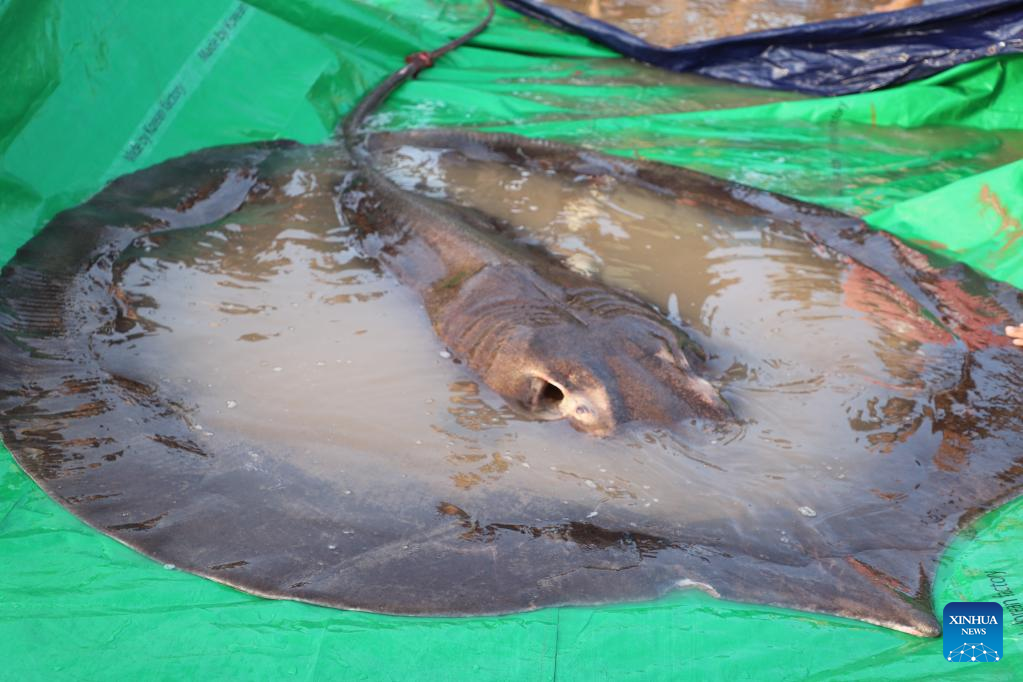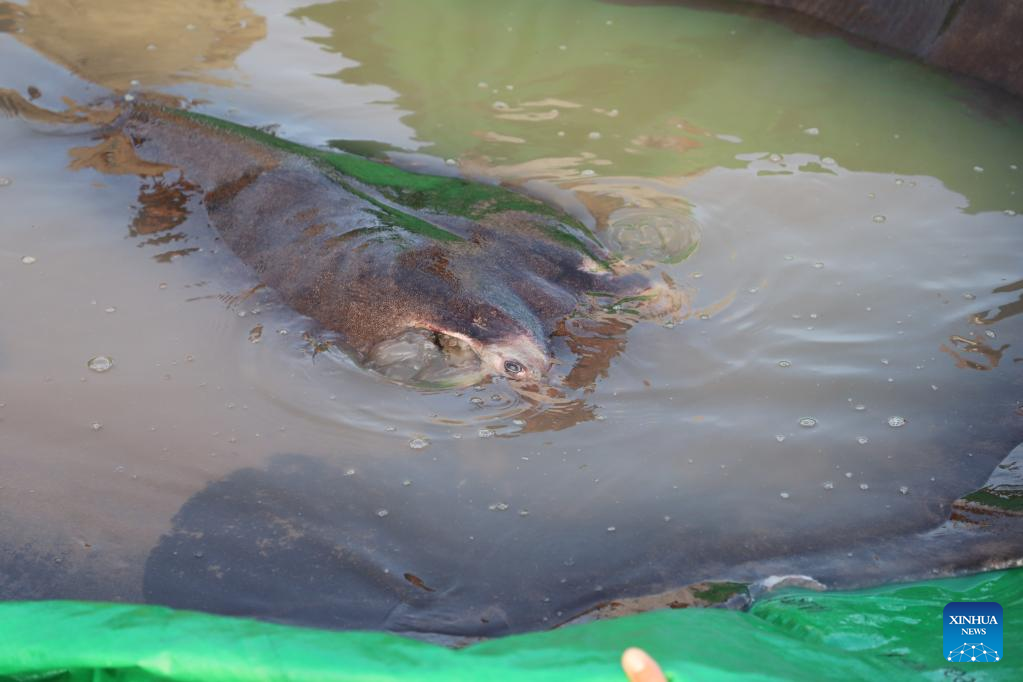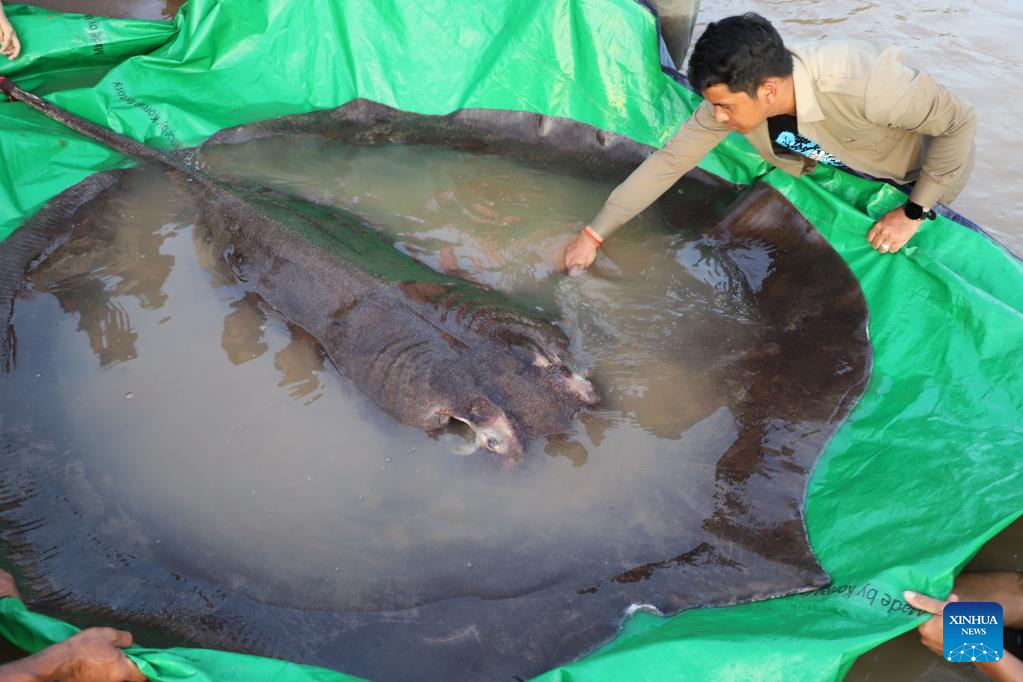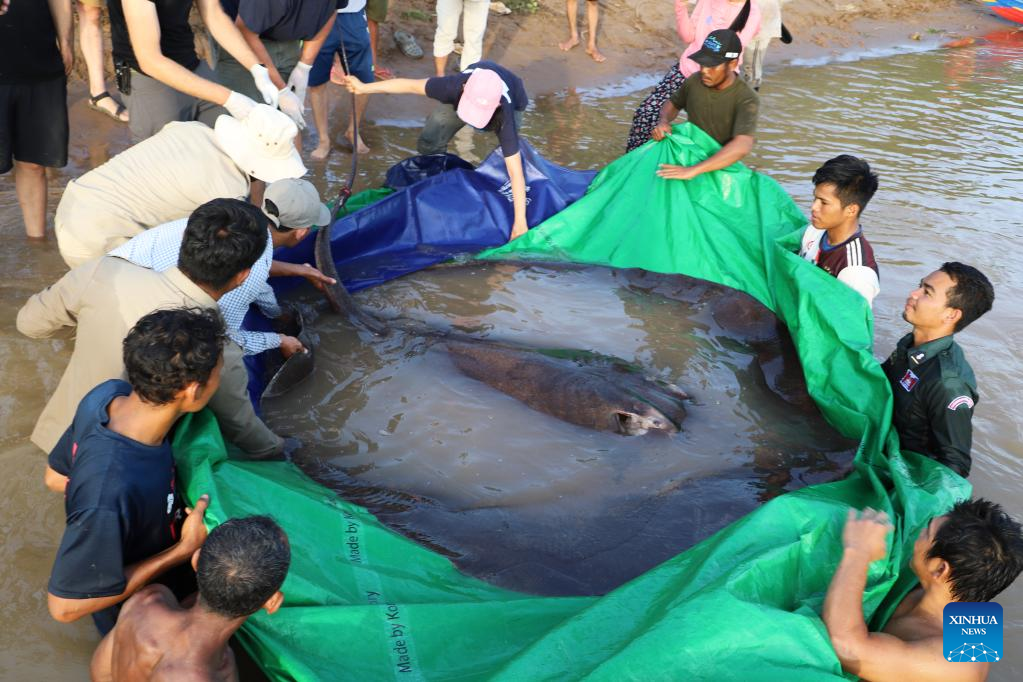
Photo taken on June 14, 2022 shows a giant freshwater stingray in Stung Treng province, Cambodia. (Chhut Chheana/Wonders of the Mekong/Handout via Xinhua)
PHNOM PENH, June 21 (Xinhua) -- The world's largest freshwater fish, a 661-pound (300-kilogram) giant stingray, has been found near a remote island in the Mekong River in northeast Cambodia's Stung Treng province, according to a Wonders of the Mekong's press statement released late on Monday.
The record-breaking stingray, which measured over 13 feet (almost 4 meters) from snout to tail, was hooked by a fisher south of the town of Stung Treng on June 13, in the middle stretches of the Mekong River, the statement said.
The previous record-holder for the largest freshwater fish on earth was a 646-pound (293-kilogram) Mekong giant catfish caught in Thailand in 2005, it added.
According to the statement, recognizing the importance of his catch, the fisher quickly contacted a team from the Wonders of the Mekong research project to help release the ray, an endangered species, back into the river.
For Zeb Hogan, a fish biologist at the University of Nevada, Reno who leads the Wonders of the Mekong, the stingray find is evidence that the natural world can still yield new and extraordinary discoveries, and that many of the largest aquatic creatures remain woefully understudied.
"In 20 years of researching giant fish in rivers and lakes on six continents, this is the largest freshwater fish that we've encountered or that's been documented anywhere worldwide," Hogan said.
"This is an absolutely astonishing discovery, and justifies efforts to better understand the mysteries surrounding this species and the incredible stretch of river where it lives," he added.
For the first time ever in Cambodia, the huge ray was fitted with an acoustic tag, the technology that will enable biologists to learn more about the secretive creature's elusive behavior.
In collaboration with the Cambodian Fisheries Administration, the Wonders of the Mekong project established a network of fishers who agreed to report catches of giant and endangered fish, including stingrays.
Last month, fishers in the same area reported to the team that they had caught a 400-pound giant female stingray, which the research team then helped release safely into the depths of the river.
"The discovery of this world record stingray indicates the special opportunity we have in Cambodia to protect this species and its core habitat," said Poum Sotha, director general of the Cambodian Fisheries Administration.
He added that the Inland Fisheries Research and Development Institute of the Cambodian Fisheries Administration will host a meeting to map out a regional species conservation action plan and solidify safeguards for the river, wildlife, fisheries, and local communities.
Chea Seila, program manager for Wonders of the Mekong, said fishers called to inform the team that a "much bigger" ray had been caught during the night of June 13.
She said the stingray was fitted with an acoustic tag to track its movements before being safely returned to the river and that it appeared strong and healthy as it quickly descended into the murky depths of the Mekong.
"Fishers now cooperate with our project when they find giant stingrays so that we can tag and release them," Seila said. "These successful releases illustrate the importance of partnerships with local communities. Together, we all have an important role to play in fisheries monitoring and conservation." ■

Photo taken on June 14, 2022 shows a giant freshwater stingray in Stung Treng province, Cambodia. (Chhut Chheana/Wonders of the Mekong/Handout via Xinhua)

Photo taken on June 14, 2022 shows a giant freshwater stingray in Stung Treng province, Cambodia. (Chhut Chheana/Wonders of the Mekong/Handout via Xinhua)

Photo taken on June 14, 2022 shows a giant freshwater stingray in Stung Treng province, Cambodia. (Chhut Chheana/Wonders of the Mekong/Handout via Xinhua)

Photo taken on June 14, 2022 shows a giant freshwater stingray in Stung Treng province, Cambodia. (Chhut Chheana/Wonders of the Mekong/Handout via Xinhua)



